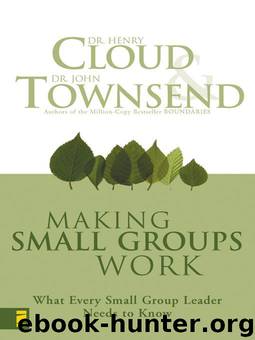Making Small Groups Work by Henry Cloud & John Townsend

Author:Henry Cloud & John Townsend [Cloud, Henry & Townsend, John]
Language: eng
Format: epub
Tags: ebook
Publisher: Zondervan
Published: 2010-02-22T23:00:00+00:00
Chapter 25
Facilitate Process
Think of a continuum that has a high school geometry lecture on the left and a walk alone in the park on the right.
What is the difference? Which one feels better to you? In which do you learn the most? Which can be done for longer periods of one’s life? Which one has value?
These questions reveal issues that surface in the difference between structured learning—like a geometry class lecture—and process and experience learning, in which we observe, experience, and come to realizations through the experience. Which has value? Both do.
The trick as a small group leader is twofold. One aspect is to decide what kind of group you will have. The other is to facilitate that decision. We value both approaches but believe a mixture of structured learning and process-and-experience learning is best. If your groups turn into lecture sessions, you had better plan on a time-limited group life or have some very interesting information. It is tough for an “information only” group to last for years. But if you include moments of experience, realization, and process orientation—all less didactic in nature—then your group can be a valuable place of learning and growth for years.
The Power of Process-oriented Statements
A big problem is that many small group leaders have little training in how to “do process.” If that sounds like an oxymoron, it sort of is. The better way to say it is “facilitate process,” and that is really your job. You are to help make it happen. By its nature, process is not something that you can do or control. It does itself. Process is an unfolding discovery of God, ourselves, and each other in connected moments of going with the flow. It is the walk-in-the-park equivalent of group experience.
Think of how you walk in a park. Your walk has a direction. In your group, the direction is your material, content, subject matter, or structure. A divorce recovery group doesn’t talk about the second coming of Christ or share recipes unless either topic somehow relates to the group purpose of helping people through the divorce process. But what if the group does wander? You might make a process statement about wandering off the path. This follows one of the most important rules of process: Use what is happening in the group to get more process to happen.
So you might notice the detour and say, “I notice that we were talking about how difficult it is to let go, and the subject changed to cooking. How did that happen? Why do you think that is?” As leader, you know something in this little process statement. You know that part of divorce recovery is to process the pain of divorce with others. When the pain grows too real, people sometimes change the subject. When you help the group see their tendency to avoid others’ pain, they can talk about why they do that and what it means to their lives. In doing that one process statement, the group leader can:
Download
This site does not store any files on its server. We only index and link to content provided by other sites. Please contact the content providers to delete copyright contents if any and email us, we'll remove relevant links or contents immediately.
Joan of Arc by Mary Gordon(4110)
Victory over the Darkness by Neil T. Anderson(2868)
The Gnostic Gospels by Pagels Elaine(2531)
Devil, The by Almond Philip C(2331)
The Nativity by Geza Vermes(2230)
The Psychedelic Gospels: The Secret History of Hallucinogens in Christianity by Jerry B. Brown(2157)
Going Clear: Scientology, Hollywood, and the Prison of Belief by Lawrence Wright(1985)
Going Clear by Lawrence Wright(1967)
A TIME TO KEEP SILENCE by Patrick Leigh Fermor(1911)
Barking to the Choir by Gregory Boyle(1821)
Old Testament History by John H. Sailhamer(1814)
Augustine: Conversions to Confessions by Robin Lane Fox(1772)
A History of the Franks by Gregory of Tours(1728)
A Prophet with Honor by William C. Martin(1725)
The Bible Doesn't Say That by Dr. Joel M. Hoffman(1680)
The Knights Templar by Sean Martin(1655)
by Christianity & Islam(1632)
The Source by James A. Michener(1613)
The Amish by Steven M. Nolt(1573)
